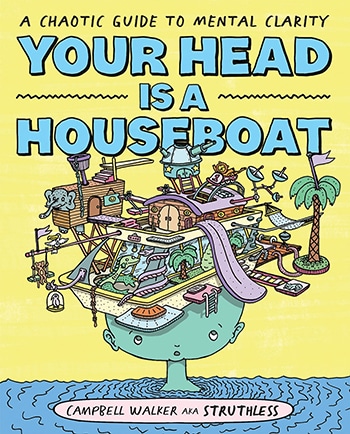Podcast Summary
Exploring the Power of Journaling for Self-Discovery and Problem-Solving: Journaling can help overcome addictions, gain mental clarity, and provide deeper insights through various techniques like brain dumping, breaking mindsets, conducting a lifestyle audit, and quelling anxiety. Experimenting with micro-journaling instead of social media can also be beneficial.
Journaling can be a powerful tool for self-discovery and problem-solving. The Art of Manliness podcast guest, Campbell Walker, shared his personal experience of how journaling helped him overcome a drug addiction and gain mental clarity. He emphasized the importance of doing a brain dump in your journal as a starting point, but also encouraged trying different techniques to gain deeper insights, such as journaling to break mindsets, conduct a lifestyle and habits audit, and quell anxiety. Additionally, Cam shared an experiment he did where he only used social media apps for posting and used micro-journaling instead when he had the urge to check social media for fun. Lastly, he discussed how journaling changed for him after becoming a dad and shared tips on making it a consistent habit. If you're interested in getting started with journaling or taking your practice to the next level, consider signing up for The Strenuous Life platform at strenuouslife.co before the enrollment ends.
Using journaling for mental clarity and self-discovery: Journaling can help navigate life's uncertainties and keep mental health in check by providing a space to process thoughts, gain perspective, and set goals.
Journaling can serve as a powerful tool for mental clarity and self-discovery, especially during times of uncertainty or distress. The speaker shares his personal experience of using journaling to cope with addiction withdrawal symptoms, which led him to write his book "Your Head is a Houseboat." He chose the metaphor of a houseboat on water to represent the mind because it suggests movement and the potential for sinking, reflecting the stakes and challenges of life. The speaker also draws parallels between the stages of life and the journey of a houseboat, with childhood being a more structured and prescribed phase, and adulthood being a more open and uncertain ocean. Journaling can help individuals navigate these uncertainties and keep their mental houseboats in tip-top shape by providing a space to process thoughts and emotions, gain perspective, and set goals.
Journaling as a tool for identifying and addressing concerns: Journaling helps declutter the mind by identifying deeper layers of concerns and unlocking new solutions through the practice of brain dumping without judgment
Journaling acts as a "shopping basket" for our thoughts, helping us identify and declutter the issues that need addressing. The practice of brain dumping, or getting all thoughts out without judgment, can lead to discovering deeper layers of concerns and unlocking new solutions. It's essential to remember that journaling doesn't need to be structured or sophisticated; it simply requires putting thoughts on paper without inhibitions. The benefits of journaling include freeing up mental space and providing a clearer perspective on problems. By consistently practicing journaling, we can gain valuable insights and make progress towards solving complex issues.
Declutter your mind with a brain dump: Regularly write down thoughts to declutter mind, feel less overwhelmed, gain clarity, and shape mindset. Balance with other practices for personal growth.
Regularly practicing a brain dump can help declutter your mind by organizing your thoughts and allowing you to emotionally detach from them. This technique involves writing down every thought, no matter how big or small, without judgment. The benefits of brain dumping can include feeling less overwhelmed, gaining clarity, and even shaping your mindset. However, it's important to remember that brain dumping should not be your only method for processing thoughts. Over time, focusing solely on the negative aspects of your thoughts through journaling can lead to a mental rut and hinder personal growth. Instead, consider incorporating other practices, such as mindfulness or problem-solving, to maintain a balanced and productive mindset.
Challenging limiting beliefs through journaling: Journaling with 'because statements' can help change fixed mindsets and challenge limiting beliefs, promoting personal growth and self-improvement.
Journaling can be an effective practice for disrupting limiting mindsets, particularly the fixed mindset. This mindset can hinder personal growth and reinforce the belief that change is impossible. Journaling, specifically using "because statements," can help challenge and change these limiting beliefs by consistently reminding oneself of reasons to believe otherwise. This practice, which is rooted in cognitive behavioral therapy, can be a powerful tool for self-improvement, even if it may feel awkward or cheesy at first. By regularly questioning and challenging limiting beliefs, individuals can make progress towards overcoming them and ultimately, grow and change.
Reflecting on oneself through exercises like a lifestyle and habits audit: Regular self-reflection through exercises like a lifestyle and habits audit, journaling, and challenging limiting beliefs can help individuals become their best selves by focusing on positive actions and progress towards desired lifestyle.
Engaging in regular self-reflection and challenging limiting beliefs can help individuals move towards becoming their best selves. This can be done through various exercises, such as a lifestyle and habits audit. In this exercise, one creates two archetypes of oneself - a negative and a positive version. Each day, actions are recorded and assigned to either the negative or positive version. By the end, the version with more votes is the goalpost to strive towards. This exercise can be particularly effective for those who respond well to tough love. Additionally, journaling about questions such as "what am I grateful for?" "what energizes me?" and "what did I learn?" can help individuals articulate their intuition and progress over time. These practices can help individuals stay focused on their goals and make informed decisions to move towards their desired lifestyle.
Reflect on thoughts and behaviors through journaling: Journaling helps identify patterns, gain clarity, and make informed decisions by acknowledging biases
Journaling can provide valuable insights into our thoughts, habits, and decisions. By reflecting on our daily experiences, we can identify patterns and gain clarity on areas where we may need to make changes. For instance, journaling helped one individual realize that he was justifying his addiction to alcohol after giving up drugs. Seeing his thoughts in writing made him aware of his deception and motivated him to fully commit to sobriety. Moreover, journaling can help us make informed decisions by acknowledging and addressing our biases. When faced with big decisions, such as moving cities, it's natural for us to have optimistic or pessimistic biases. By comparing the worst possible days in each scenario, we can make a more objective comparison and avoid being swayed by romanticized notions. In essence, journaling is a powerful tool for self-reflection and growth. It can help us understand our thoughts and behaviors, overcome biases, and make informed decisions. So, take a few minutes each day to write down your thoughts and feelings – you might be surprised by what you discover.
Quick Decision Making Practice: Setting a timer for 60 seconds to write down a decision can help recognize hidden answers and manage anxiety through recognizing catastrophizing thoughts' lack of basis in reality.
Trying to approach decisions objectively is a worthy goal, even if it's not always achievable. A helpful journaling practice for making decisions is to set a timer for 60 seconds and write down what your decision would be if you only had that minute to decide. This can help you recognize answers you may already know but haven't admitted or accepted yet. For those dealing with anxiety, journaling can be beneficial in understanding how it protects you and helping to bring catastrophizing thoughts into reality. Catastrophizing is a common coping mechanism that can be hard to let go of because it's rooted in protecting us. A useful journaling technique for managing catastrophizing thoughts is to consider what you would bet money on, as many of these thoughts have no basis in reality. Overall, journaling can be a powerful tool for gaining clarity, making decisions, and managing anxiety.
Betting on our fears as a way to manage them: Assessing the likelihood of fears through hypothetical betting and journaling can help manage anxiety and make informed decisions based on reality.
While some anxieties may serve as protective measures, many of our fears are irrational and can be managed through practical techniques. One such technique is to bet hypothetically on the outcome of our fears, as if we were making a financial investment. This can help us assess the likelihood of our fears coming to fruition and encourage us to reconsider their validity. Journaling is another effective method for managing anxiety and making decisions. By reflecting on our thoughts and feelings, we can challenge assumptions, identify sources of energy drain, and make informed decisions based on our values and priorities. The choice of journaling medium, whether it be paper and pen, computer, or smartphone, ultimately depends on personal preference. The key is to establish the problem at hand and choose a journaling technique accordingly. Remember, many of our fears are not based in reality, and by adopting a more objective perspective, we can reduce their impact on our lives.
Personal journey to find effective thought capturing method: Small intentional actions can lead to significant positive changes in daily habits, try replacing social media with micro-journaling for improved mental clarity and mood.
Finding the most effective method for capturing and processing thoughts is a personal journey. Whether it's through handwriting, typing, or voice recording, the technique that provides the least resistance and helps you structure your thoughts most effectively is the right one for you. The experiment of replacing social media with micro-journaling, as shared in the video, was prompted by a desire to address phone addiction. By replacing social media apps with the Notes app, the individual was able to access a sense of embarrassment and shame, which in turn helped them write down their thoughts instead of mindlessly scrolling. This simple change led to a reduction in social media use, increased mental clarity, and improved mood. The experiment served as a reminder that small, intentional actions can lead to significant positive changes in our daily habits.
Micro-journaling: Write down thoughts for better memory and self-awareness: Regularly writing thoughts and feelings in a notes app can lead to improved memory, better self-awareness, and reduced reliance on social media. Make it a habit by setting aside time daily and limiting distractions.
Practicing micro-journaling, or regularly writing down thoughts and experiences in a notes app, can lead to improved memory, better self-awareness, and reduced reliance on social media. This simple habit involves setting aside just a few minutes each day to jot down thoughts and feelings, without any rules or expectations for what to write. By shifting the location of social media apps on your phone and using tools like lockout apps or deletion to limit distractions, you can make micro-journaling a more consistent and productive part of your daily routine. This practice can help break the mindless scrolling habit and provide a more meaningful and mindful use of your digital environment.
Making journaling actionable in adulthood: Consistently journaling as an adult can be made more effective by focusing on actions to take based on reflections, simplifying the process, and maintaining consistency for valuable insights.
Journaling can be a powerful tool for personal growth, but it's important to make it a consistent habit. One way to do this is by making it more action-oriented as you transition into adulthood. This means focusing on the next steps you can take based on your journaling, rather than just delving into introspection. The speaker shared his experience of how becoming a new father disrupted his journaling practice, but he was able to get back into it by making it more actionable. He also suggested lowering the barrier to entry by simplifying the journaling process, such as using a brain dump or prompts, instead of feeling like it needs to be a grand, formal event. He emphasized that the consistency of journaling is key, and looking back on old entries can provide valuable insights into how much we've grown.
Make journaling simple and natural: Start with a sentence or two, attach journaling to an existing routine, and use resources like Cam Walker's book and YouTube channel for more information.
Journaling doesn't have to be a daunting or time-consuming task. According to Cam Walker, author of "Your Head is a Houseboat," you can start with just a sentence or two. Lowering the barrier to entry is the first step. The second step is to attach journaling to an existing routine, such as writing a to-do list. By doing this, you're making journaling a natural part of your day. Cam also mentioned that his book and YouTube channel, Struthless, are great resources for those interested in learning more about journaling and its benefits. Overall, the key takeaway is that journaling is a simple and effective tool for self-reflection and personal growth, and it can easily be incorporated into your daily routine.













